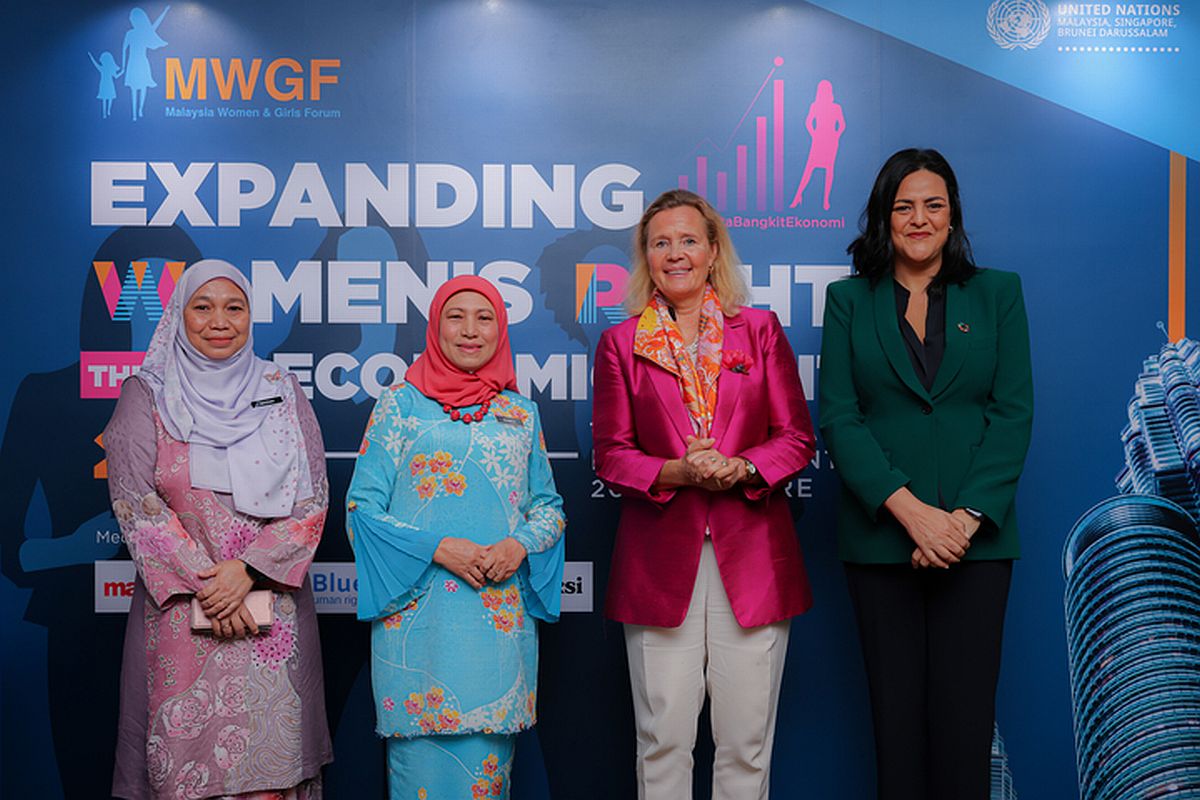KUALA LUMPUR, Dec 15 – Women, Family and Community Development Minister Nancy Shukri today equated investment in women’s sexual and reproductive health to investment in their economic independence and the country’s economic growth.
The newly appointed minister cited sexual and reproductive health and family support issues as the main impediments to women’s labour force participation in Malaysia.
Malaysia has one of the lowest female labour force participation rates (LFPR) in the region at 55.6 per cent as of last July, compared to male LFPR at 82 per cent.
“As Malaysia charts her recovery from the devastating impacts of the pandemic, Malaysian women’s untapped talent and economic potential is key to national recovery and propelling the country towards achieving the 2030 SDGs (Sustainable Development Goals),” Nancy said in her keynote speech at the third Malaysia Women and Girls Forum (MWGF) today.
“Investing in women’s sexual and reproductive health and reproductive rights is investment in women’s economic independence and Malaysia’s guaranteed economic growth and recovery.”
Nancy, who is also Santubong MP from Gabungan Parti Sarawak (GPS), acknowledged that there is still “room for improvement” in providing comprehensive sexuality education and reproductive health services, as well as in ensuring comprehensive child care to attract women back into the workforce.
“The commitment to support women by building a society of equal opportunities is reflected in ongoing legislative reforms, policies and plans.”
Nancy highlighted the National Population and Family Development Board’s (LPPKN) Social Empowerment of Reproductive Health Initiative (Kit SERI) that aims to improve access to period products, facilities, and social support in practising menstrual hygiene, as well as access to reproductive health education.
The programme is targeted at teenage girls aged 13 to 17 from households in the bottom 40 per cent (B40) category.
Nancy also said the Women, Family and Community Development Ministry (KPWKM) launched last September a newly revised national Reproductive Health and Social Education Policy (Pekerti) 2022-2025 that highlights a whole-of-nation approach towards reproductive health and social education.
“The revised Pekerti takes into account religious diversity, age group, culture, gender and life values of the Malaysians, in line with the Sustainable Development Goals 2030 target; namely gender equality, and the empowerment of women and girls.”
“The strategies aligned are directed on reproductive and social health education that applies to all levels of society. The development and evaluation of this policy will be monitored by the Advisory and Coordinating Committee for Reproductive Health (ACCRH) headed by LPPKN.”
The women’s minister said KPWKM needs to relook into the burden of unpaid care work by transforming it into a broader care economy.
“This has the potential to transition women, particularly from B40 backgrounds from informal entrepreneurship into the formal labour force as micro, small and medium entrepreneurs providing quality early childcare and day care for all working mothers.
“Ensuring access to such essential family support services assures mothers they can go to work without worrying about their babies and children’s wellbeing.”
Nancy later told reporters at the sidelines of the conference that the government should not simply offer sanitary pads at ministry or government offices, referring to Health Minister Dr Zaliha Mustafa’s plan to tackle period poverty by providing free sanitary pads in the Ministry of Health (MOH), beginning with the minister’s office.
“I’m not sure how it works, but it is difficult to identify those who can or cannot access sanitary pads within the office,” Nancy was quoted as saying by Free Malaysia Today.
“We should target those who are truly struggling, like the Orang Asli and B40 income group.”
Enlarge Malaysia’s Productive Choices By Expanding Women’s Reproductive Choices
United Nations Population Fund (UNFPA) Malaysia representative Dr Asa Torkelsson similarly said that ensuring the sexual and reproductive health rights of women and girls is key to removing the burdens they face in reaching economic equity.
“While this may seem a complex challenge, from the point of view of UNFPA, the United Nations reproductive health agency that I represent, there are quick wins as by expanding women’s reproductive choices, our productive choices can be enlarged too,” she said in a speech at the MWGF.
“Indeed, UNFPA’s abundant research shows that investing in the health, well-being and potential of women and girls is an investment into the health, well-being and prosperity of a country, its presence and future. Being able to choose the number, timing and spacing of children can bolster economic and social development.”
Karima El Korri, United Nations resident coordinator for Malaysia, Singapore and Brunei, said addressing economic inequities goes beyond labour market policies that promote women’s participation.
“It starts at the structural level by addressing a myriad of interlocked issues, ranging from legal protection to unpaid care-work, to GBV (gender-based violence), to access to finance, to social protection, to sexual and reproductive health, to harmful practices,” she said in a speech at the MWGF.
“Economic inequities contribute to further digging the inequality gap. Economic under-representation creates a vicious cycle of vulnerability, perpetuated by social stigmas, poverty, unequal access to health care, to justice and weak political representation and participation.”












